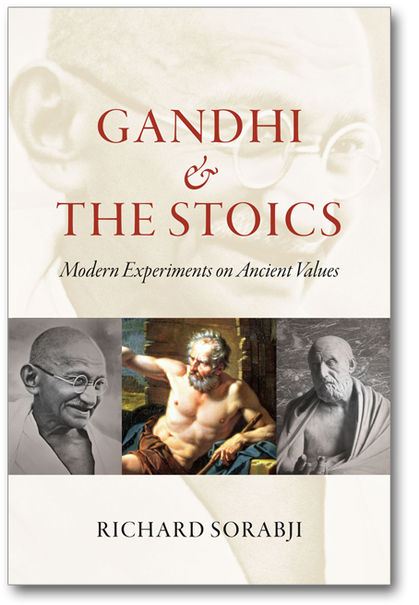Gandhi and the Stoics: Modern experiments on ancient values

Preview: Faisal Devji, Reader in Indian History at Oxford University
This has surely got to be one of the most original and unusual contributions to the vast literature on Gandhi. It is also one of the very few philosophical analyses of the Mahatma’s life and thought. These two factors alone would be sufficient to recommend Richard Sorabji’s manuscript for publication, but there are more reasons still. Much of the academic work on Gandhi has struggled to historicize his thinking in such a way as to subordinate it to the particularities of Gandhi’s caste, upbringing, and the like. And so we end up with analyses that diminish if they do not entirely discount Gandhi’s role as a thinker of great originality and influence. Not only has Sorabji gone against this current of scholarship to demonstrate that the Mahatma was a coherent and consistent thinker, he has in some ways also, and in an entirely positive way, “de-historicized” Gandhi’s thought by linking it with that of the Stoics.
Not that Sorabji is ignorant or even dismissive of the Mahatma’s historical particularity and context—on the contrary he is extraordinarily well aware of this background and the secondary literature that deals with it. Rather he offers us a way to think about Gandhi’s nonviolence in a philosophically complex way that also places the Mahatma in a much broader historical canvas, one that includes not only Stoicism and ancient philosophy in general, but also early Christianity and its “recovery” by the Mahatma’s correspondent Tolstoy. The dialogue that the manuscript creates between these great and otherwise disconnected movements provides one of the immense pleasures that it offers the reader. Suddenly we are able to exit the narrow compass of Indian nationalism, within which Gandhi tends to be squeezed by academics, and consider his career from a number of fresh perspectives.
Addressing the major ethical and philosophical themes of Gandhi’s thought in a series of concise chapters, Sorabji is able to bring to light the transnational and indeed universal aspect of the Mahatma’s ideas, though in a way that never degenerates into special pleading or hagiography, both very common in the literature on Gandhi. Remarkable about his exposition is the fact that, much like Gandhi’s own writing, it manages to engage with complex ideas in a deceptively simple and straightforward way. This is not what one would expect from a work by an important classicist devoted to Gandhi’s philosophical thought as compared with that of the Stoics. The result is sometimes unexpected and always engaging. There is a new interest in Gandhi the world over, and, correspondingly, a new set of approaches to his work. Richard Sorabji’s book should establish itself as one of the first examples of this new scholarship.
This will be a book that appeals to a wide audience, both general and specialist, one to be enjoyed for its own sake as much as for any new light it throws on the Mahatma. It should be marketed not just to philosophers, classicists or South Asianists, but also to those interested in ethics and political thought.
JAIPUR LITERARY FESTIVAL 2013
|
'Gandhi vs Gandhi'
Richard Sorabji, Charles Di Salvo and Ananya Vajpeyi in conversation with Faisal Devji. Presented by Harvard University Press. |
'Republic of Ideas',
Patrick French, Ashis Nandy, Ashutosh, Tarun Tejpal and Richard Sorabji in conversation with Urvashi Butalia, Presented by Ambuja Neotia Group. |
'Gandhi and the Stoics',
in conversation with AuthorTV. |